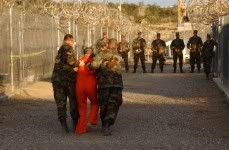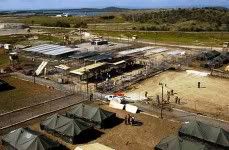
|
There has been quite a bit of conflicting information in the news lately and speculation about what Obama intends to do about Guantanamo Bay and whether Bush has set things up in such a way that it may be very difficult if not nearly impossible to close the place, and it appears to be shaping up as one of the most defining issues of the opening days of his presidency, and whether or not he will live up to campaign promises or just made them out of expediency during his campaign.
Center for Constitutional Rights President Michael Ratner talks about the issue with Real News CEO Paul Jay:
As the world waits for examples of the ways the Obama administration is going to distance itself from the exiting Bush administration, his transition team confirmed on Monday that they will follow through on Obama’s promise to close Bush’s controversial prison camp located at the US Navy base in Guantanamo Bay, Cuba.
Senior Editor Paul Jay spoke to constitutional law expert Michael Ratner who expressed his approval for the news but couched that support in an explanation of the variety of other tough decisions that accompany the decision to close the base.
Most of the issues hinge around the fates of those currently imprisoned at Guantanamo, both those who will face prosecution and those who will not. Michael expresses his desire that those who the US does not plan to charge, a group that represents the vast majority of the inmates, should be released immediately. Those remaining, Michael believes, should be tried in civilian courts and not by military commission.
This is a move that human rights groups and Michael himself have been advocating for a variety of reasons, one of which has been that civilian courts–unlike military commissions–do not admit evidence obtained under the use of torture.
November 13, 2008 – 11 min 46 sec
When and how will Obama close Guantanamo?
Michael Ratner: Focus is on fate of hundreds detained at Guantanamo who will never be put on trial
Michael Ratner is President of the Center for Constitutional Rights (CCR) in New York. He has taught at Yale Law School, lectured at Columbia Law School, and was President of the National Lawyers Guild.


1 comments
Author